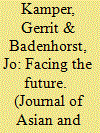| Srl | Item |
| 1 |
ID:
097744


|
|
|
|
|
| Publication |
2010.
|
| Summary/Abstract |
This study focuses on the impact of social change on the black youth of post-apartheid South Africa. It is argued that adolescents' perspectives on their future in this country are of particular relevance due to the extent of social problems which are currently experienced in South Africa. With South Africa's history of apartheid and discrimination, it emerges that the influence of traditional cultural norms and values on the black youth is slowly but surely diminishing. They tend to share the general consumerism of South Africa's wealthy classes, and many lack the history of participation in the struggle for political freedom. Amidst severe social problems, such as poverty, unemployment, HIV/AIDS and violent crime, the findings of an empirical investigation into the views of 391 black adolescents from a variety of socio-economic backgrounds indicate that a general spirit of optimism and independence exists, paired with a strong desire to escape the trappings of poverty and the inferiority of the past.
|
|
|
|
|
|
|
|
|
|
|
|
|
|
|
|
| 2 |
ID:
155803


|
|
|
|
|
| Summary/Abstract |
The language of instruction in South Africa is currently an extremely controversial issue. As a result of South Africa’s political history, English is almost always chosen as the language of instruction. However, in many cases, students have not been adequately exposed to English when they enter the Foundation Phase. This study reports on research conducted at an Ex-Model C (formerly privileged) primary school in South Africa where an immersion-type model is followed with English as the instructional language. The aim of the study was to explore the practices implemented by Foundation Phase teachers to teach students through the medium of English, and to ascertain how the school has managed to maintain a consistently high academic standard, despite the language difficulties of their students. The findings of the study can make a significant contribution when similar strategies are implemented in schools which are faced by challenges similar to those of the sample school.
|
|
|
|
|
|
|
|
|
|
|
|
|
|
|
|